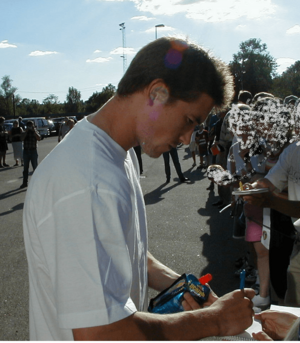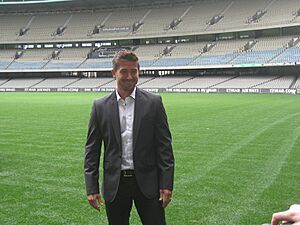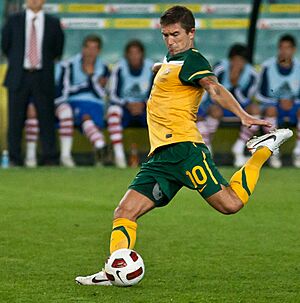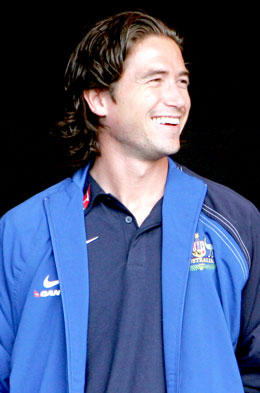Harry Kewell facts for kids
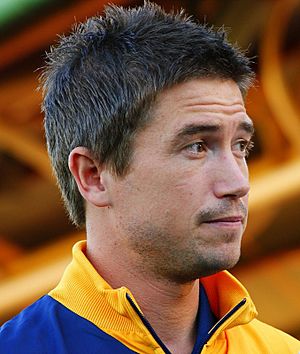
Kewell in 2008
|
||||||||||||||||||||||||||||||||||
| Personal information | ||||||||||||||||||||||||||||||||||
|---|---|---|---|---|---|---|---|---|---|---|---|---|---|---|---|---|---|---|---|---|---|---|---|---|---|---|---|---|---|---|---|---|---|---|
| Full name | Harry Kewell | |||||||||||||||||||||||||||||||||
| Date of birth | 22 September 1978 | |||||||||||||||||||||||||||||||||
| Place of birth | Sydney, Australia | |||||||||||||||||||||||||||||||||
| Height | 1.80 m (5 ft 11 in) | |||||||||||||||||||||||||||||||||
| Position(s) | Left winger, attacking midfielder, second striker | |||||||||||||||||||||||||||||||||
| Youth career | ||||||||||||||||||||||||||||||||||
| Smithfield Hotspurs | ||||||||||||||||||||||||||||||||||
| 1990–1993 | Club Marconi | |||||||||||||||||||||||||||||||||
| 1993–1996 | Leeds United | |||||||||||||||||||||||||||||||||
| Senior career* | ||||||||||||||||||||||||||||||||||
| Years | Team | Apps | (Gls) | |||||||||||||||||||||||||||||||
| 1996–2003 | Leeds United | 181 | (45) | |||||||||||||||||||||||||||||||
| 2003–2008 | Liverpool | 93 | (12) | |||||||||||||||||||||||||||||||
| 2008–2011 | Galatasaray | 63 | (22) | |||||||||||||||||||||||||||||||
| 2011–2012 | Melbourne Victory | 25 | (8) | |||||||||||||||||||||||||||||||
| 2013 | Al-Gharafa | 3 | (1) | |||||||||||||||||||||||||||||||
| 2013–2014 | Melbourne Heart | 16 | (2) | |||||||||||||||||||||||||||||||
| Total | 381 | (90) | ||||||||||||||||||||||||||||||||
| International career | ||||||||||||||||||||||||||||||||||
| 1994–1995 | Australia U17 | 10 | (1) | |||||||||||||||||||||||||||||||
| 1997 | Australia U20 | 3 | (0) | |||||||||||||||||||||||||||||||
| 1996–2012 | Australia | 58 | (17) | |||||||||||||||||||||||||||||||
| Managerial career | ||||||||||||||||||||||||||||||||||
| 2017–2018 | Crawley Town | |||||||||||||||||||||||||||||||||
| 2018 | Notts County | |||||||||||||||||||||||||||||||||
| 2020–2021 | Oldham Athletic | |||||||||||||||||||||||||||||||||
| 2021 | Barnet | |||||||||||||||||||||||||||||||||
| 2023–2024 | Yokohama F. Marinos | |||||||||||||||||||||||||||||||||
|
Medal record
|
||||||||||||||||||||||||||||||||||
| *Club domestic league appearances and goals | ||||||||||||||||||||||||||||||||||
Harry Kewell (born 22 September 1978) is a famous Australian soccer coach and former player. He recently managed Yokohama F. Marinos in Japan.
As a player, Harry Kewell played for big clubs like Leeds United, Liverpool, and Galatasaray. He was known as a left winger, but could also play as an attacking midfielder or second striker. Many people call him "Australia's finest soccer export." In 2012, Australian fans, players, and media voted him Australia's greatest soccer player.
Kewell scored a key goal against Croatia in the 2006 FIFA World Cup. This goal helped Australia reach the knockout stages for only the second time ever. He is also the only Australian man to have played in a UEFA Champions League final. He was part of the Liverpool team that won the 2005 UEFA Champions League final.
Contents
Early Life and Football Beginnings
Harry Kewell was born in Sydney, Australia, on 22 September 1978. His father was English, and his mother was Australian. Growing up, Harry was a big fan of Liverpool.
He started playing junior football for Smithfield Hotspurs. Later, he joined Marconi Fairfield as a teenager.
First Steps in Europe
When Harry was 14, he traveled to Thailand, Italy, and England with his Marconi team. They played against junior teams, including Milan. This trip gave him his first experience of football in Europe.
At 15, Kewell got a chance to try out for Premiership club Leeds United. He went with his future Australian teammate Brett Emerton. Both did well, but only Kewell could join Leeds because his father's English background helped with visa rules.
Club Career Highlights
Harry Kewell played for several major clubs during his career. He was known for his skill and exciting play.
Playing for Leeds United (1993–2003)
Kewell spent three seasons playing for the Leeds United youth team. He made his first team debut at just 17 years old in March 1996. In 1997, he helped the Leeds youth team win the FA Youth Cup.
He scored his first goal for Leeds in October 1997. Kewell became one of Leeds' most promising young stars. He often played as a left midfielder or in attack.
In the 1999–2000 season, Kewell had a fantastic year. He won the PFA Young Player of the Year award. Italian club Internazionale offered a lot of money for him, but Leeds said no. Kewell helped Leeds reach the semi-finals of the UEFA Champions League in 2000–01. He scored 45 goals in over 180 games for Leeds.
Time at Liverpool (2003–2008)
Kewell joined Liverpool in 2003, the club he supported as a boy. He chose Liverpool even though other big clubs like Chelsea and Manchester United offered more money. He was given the famous number seven shirt.
He made his debut for Liverpool in August 2003. His first goal for the club was in a big game against rivals Everton. In his first season, he scored ten goals for Liverpool.
A big moment for Kewell was winning the UEFA Champions League in 2005. Liverpool beat Milan in a thrilling final. Kewell was the only Australian to win this major European trophy at the time. He had to leave the final early due to an injury.
After recovering from injuries, Kewell showed his great form in the 2005–06 season. He scored important goals, including one against Tottenham Hotspur. He also played in the 2006 FA Cup final, which Liverpool won.
Kewell continued to face injuries during his time at Liverpool. He played his last game for the club in May 2007, scoring a penalty against Charlton Athletic. Liverpool decided not to offer him a new contract in May 2008.
Playing for Galatasaray (2008–2011)
On 5 July 2008, Kewell signed a two-year contract with Turkish champions Galatasaray. He chose the number 19 shirt as a sign of respect for Leeds United, where his career began.
Kewell made an instant impact at Galatasaray. He scored his first goal for the club just 20 seconds after coming on as a substitute in the Turkish Super Cup, which Galatasaray won. He continued to score important goals in the league and in the UEFA Cup.
In the 2009–10 season, Kewell scored 14 goals in 28 matches. He often played as the main striker. He scored in the Turkish Cup and in the UEFA Europa League qualifying rounds. Galatasaray reached the knockout phase of the Europa League.
Kewell was very popular with Galatasaray fans. They called him "Harry the Wizard" or the "Wizard of Oz" because of his magical play. He left Galatasaray in May 2011 after his contract ended.
Return to Australia: Melbourne Victory (2011–2012)
On 20 August 2011, Harry Kewell signed a three-year deal with Australian club Melbourne Victory. Fans were very excited, with hundreds welcoming him at the airport.
He made his first appearance in the 2011–12 A-League season in October 2011. Kewell scored his first goal for Victory from a penalty in November 2011. He started to show his great form, scoring several important goals. He scored two goals in one game against Brisbane Roar.
Kewell did not stay with Melbourne Victory after his first season. He returned to Europe to be closer to his family.
Short Stays: Al-Gharafa and Melbourne Heart (2013–2014)
In April 2013, Kewell briefly played for Al-Gharafa in Qatar. He scored one goal in three games there.
In June 2013, he joined Melbourne Heart in Australia for the 2013–14 A-League season. He faced more injury problems during this time.
On 26 March 2014, Harry Kewell announced he would retire from professional football at the end of the A-League season. His last match was on 12 April 2014. In 2016, he received the Alex Tobin Medal, Australia's highest football honor.
International Career for Australia
Harry Kewell became one of the youngest players ever to play for the Australia national team. He made his debut in April 1996 when he was 17.
World Cup Qualifiers and Confederations Cup
In November 1997, Kewell scored his first goal for Australia against Iran in a World Cup qualifier. Australia drew that game 1–1. In the return game in Melbourne, Kewell scored again, but Iran drew 2–2 and qualified for the World Cup on away goals.
A few months later, Kewell helped Australia reach the final of the 1997 FIFA Confederations Cup. He scored a "golden goal" in extra time against Uruguay to win the semi-final 1–0. Australia then lost to Brazil in the final.
In 2003, Kewell scored in a famous 3–1 win for Australia against England.
2006 FIFA World Cup Success
On 16 November 2005, Australia qualified for the 2006 FIFA World Cup after beating Uruguay. It was Australia's first World Cup qualification since 1974. Kewell played a big part in this victory, helping to set up the equalizer and scoring the first penalty in the shootout.
In the World Cup finals, Kewell scored Australia's second goal against Croatia. This goal made the score 2–2 and allowed Australia to qualify for the knockout stage for the first time. He was named Man of the Match for his performance. Unfortunately, he missed the next game against Italy due to a serious infection in his foot.
Asian Cup and 2010 World Cup
Kewell returned to the national team in 2007 for the 2007 AFC Asian Cup. He scored in a 3–0 win against Singapore and a 4–0 win over Thailand. Australia reached the quarter-finals but lost to Japan in a penalty shootout.
In 2008, Kewell captained Australia for a World Cup qualifier against Iraq, scoring the only goal in a 1–0 win. He also scored against Qatar and Uzbekistan in qualifiers.
At the 2010 FIFA World Cup in South Africa, Kewell was sent off in the game against Ghana for handling the ball on the goal line. This was a tough moment for him and the team.
2011 AFC Asian Cup Finalist
Kewell played in all of Australia's matches in the 2011 AFC Asian Cup. He scored three goals in the tournament. His goals helped Australia reach the semi-finals for the first time. He scored a header in extra time against Iraq to win 1–0. He also scored in the 6–0 semi-final win against Uzbekistan. Australia reached the final but lost 1–0 to Japan.
Harry Kewell scored his last goal for Australia in February 2012 against Saudi Arabia. He played his final game for Australia in June 2012 against Oman.
Management Career
After retiring as a player, Harry Kewell started a coaching career. He worked with young players in Australia and earned his coaching licenses.
Coaching in England
In July 2015, Kewell became the head coach of the Watford Under-21 team. He then became the first Australian to coach a professional English club when he took charge of Crawley Town in May 2017. He led Crawley Town to a 14th-place finish in League Two.
He later managed Notts County and Oldham Athletic. In June 2021, he was appointed head coach of Barnet in the National League, but his time there was short.
Coaching in Scotland and Japan
In June 2022, Kewell joined Scottish Premiership champions Celtic as a first-team coach. He worked under fellow Australian manager Ange Postecoglou.
In December 2023, Kewell became the head coach of Yokohama F. Marinos in Japan. He led the team to the AFC Champions League final in May 2024, where they finished as runners-up. He left the club in July 2024.
Personal Life
Harry Kewell was born in Smithfield, Sydney. He is married to English actress Sheree Murphy. They met in Leeds in 2000 and got married in Las Vegas in 2002. They have four children together.
Kewell has also supported the introduction of a new A-League team in Western Sydney, where he grew up. He is a fan of the Australian rugby league team Canterbury-Bankstown Bulldogs.
Career Statistics
Club Appearances and Goals
| Club | Season | League | National cup | League cup | Continental | Other | Total | |||||||
|---|---|---|---|---|---|---|---|---|---|---|---|---|---|---|
| Division | Apps | Goals | Apps | Goals | Apps | Goals | Apps | Goals | Apps | Goals | Apps | Goals | ||
| Leeds United | 1995–96 | Premier League | 2 | 0 | — | — | — | — | 2 | 0 | ||||
| 1996–97 | 1 | 0 | — | — | — | — | 1 | 0 | ||||||
| 1997–98 | 29 | 5 | 4 | 2 | 2 | 1 | — | — | 35 | 8 | ||||
| 1998–99 | 38 | 6 | 5 | 1 | 2 | 2 | 4 | 0 | — | 49 | 9 | |||
| 1999–2000 | 36 | 10 | 3 | 2 | 2 | 0 | 12 | 5 | — | 53 | 17 | |||
| 2000–01 | 17 | 2 | 0 | 0 | 0 | 0 | 9 | 0 | — | 26 | 2 | |||
| 2001–02 | 27 | 8 | 0 | 0 | 1 | 1 | 7 | 2 | — | 35 | 11 | |||
| 2002–03 | 31 | 14 | 4 | 1 | 1 | 0 | 5 | 1 | — | 41 | 16 | |||
| Total | 181 | 45 | 16 | 6 | 8 | 4 | 37 | 8 | — | 242 | 63 | |||
| Liverpool | 2003–04 | Premier League | 36 | 7 | 3 | 0 | 2 | 1 | 8 | 3 | — | 49 | 11 | |
| 2004–05 | 18 | 1 | 0 | 0 | 1 | 0 | 12 | 0 | — | 31 | 1 | |||
| 2005–06 | 27 | 3 | 6 | 0 | 1 | 0 | 6 | 0 | 1 | 0 | 41 | 3 | ||
| 2006–07 | 2 | 1 | 0 | 0 | 0 | 0 | 1 | 0 | 0 | 0 | 3 | 1 | ||
| 2007–08 | 10 | 0 | 1 | 0 | 1 | 0 | 3 | 0 | — | 15 | 0 | |||
| Total | 93 | 12 | 10 | 0 | 5 | 1 | 30 | 3 | 1 | 0 | 139 | 16 | ||
| Galatasaray | 2008–09 | Süper Lig | 26 | 8 | 1 | 0 | — | 9 | 4 | 1 | 1 | 37 | 13 | |
| 2009–10 | 17 | 9 | 2 | 1 | — | 9 | 4 | — | 28 | 14 | ||||
| 2010–11 | 20 | 5 | 3 | 0 | — | 3 | 2 | — | 26 | 7 | ||||
| Total | 63 | 22 | 6 | 1 | — | 21 | 10 | 1 | 1 | 91 | 34 | |||
| Melbourne Victory | 2011–12 | A-League | 25 | 8 | — | — | — | — | 25 | 8 | ||||
| Al-Gharafa | 2012–13 | QSL | 3 | 1 | — | — | — | — | 3 | 1 | ||||
| Melbourne Heart | 2013–14 | A-League | 16 | 2 | — | — | — | — | 16 | 2 | ||||
| Career total | 381 | 90 | 32 | 7 | 13 | 5 | 88 | 21 | 2 | 1 | 516 | 124 | ||
International Appearances and Goals
- Source:
| Australia | ||
| Year | Apps | Goals |
|---|---|---|
| 1996 | 2 | 0 |
| 1997 | 6 | 3 |
| 2000 | 1 | 0 |
| 2001 | 3 | 0 |
| 2003 | 2 | 2 |
| 2004 | 3 | 1 |
| 2005 | 2 | 0 |
| 2006 | 4 | 1 |
| 2007 | 6 | 2 |
| 2008 | 9 | 3 |
| 2009 | 7 | 1 |
| 2010 | 2 | 0 |
| 2011 | 8 | 3 |
| 2012 | 3 | 1 |
| Total | 58 | 17 |
- Source:
| # | Date | Location | Opponent | Score | Result | Competition |
|---|---|---|---|---|---|---|
| 1. | 22 November 1997 | Tehran, Iran | 1–1 | Draw | 1998 FIFA World Cup qualification | |
| 2. | 29 November 1997 | Melbourne, Australia | 2–2 | Draw | 1998 FIFA World Cup qualification | |
| 3. | 19 December 1997 | Riyadh, Saudi Arabia | 1–0 | Win | 1997 FIFA Confederations Cup | |
| 4. | 12 February 2003 | London, England | 3–1 | Win | Friendly | |
| 5. | 7 September 2003 | Reading, England | 2–1 | Win | Friendly | |
| 6. | 12 October 2004 | Sydney | 6–0 | Win | 2004 OFC Nations Cup | |
| 7. | 22 June 2006 | Stuttgart, Germany | 2–2 | Draw | 2006 FIFA World Cup | |
| 8. | 30 June 2007 | Kallang, Singapore | 3–0 | Win | Friendly | |
| 9. | 16 July 2007 | Bangkok, Thailand | 4–0 | Win | 2007 AFC Asian Cup | |
| 10. | 1 June 2008 | Brisbane, Australia | 1–0 | Win | 2010 FIFA World Cup qualification | |
| 11. | 15 June 2008 | Doha, Qatar | 3–1 | Win | 2010 FIFA World Cup qualification | |
| 12. | 6 September 2008 | Eindhoven, Netherlands | 2–1 | Win | Friendly | |
| 13. | 1 April 2009 | Sydney, Australia | 2–0 | Win | 2010 FIFA World Cup qualification | |
| 14. | 11 January 2011 | Doha, Qatar | 4–0 | Win | 2011 AFC Asian Cup | |
| 15. | 22 January 2011 | Doha, Qatar | 1–0 | Win | 2011 AFC Asian Cup | |
| 16. | 25 January 2011 | Doha, Qatar | 6–0 | Win | 2011 AFC Asian Cup | |
| 17. | 29 February 2012 | Melbourne, Australia | 4–2 | Win | 2014 FIFA World Cup qualification |
Managerial Statistics
| Team | From | To | Record | Ref. | ||||
|---|---|---|---|---|---|---|---|---|
| P | W | D | L | Win % | ||||
| Crawley Town | 23 May 2017 | 31 August 2018 | 57 | 18 | 12 | 27 | 31.58 | |
| Notts County | 31 August 2018 | 13 November 2018 | 15 | 3 | 4 | 8 | 20.00 | |
| Oldham Athletic | 1 August 2020 | 7 March 2021 | 41 | 17 | 6 | 18 | 41.46 | |
| Barnet | 10 June 2021 | 20 September 2021 | 7 | 0 | 2 | 5 | 0.00 | |
| Yokohama F. Marinos | 31 December 2023 | 15 July 2024 | 33 | 13 | 8 | 12 | 39.39 | |
| Total | 153 | 51 | 32 | 70 | 33.33 | |||
Honours and Awards
Player Achievements
Leeds United Youth
- FA Youth Cup: 1996–97
Liverpool
- FA Cup: 2005–06
- UEFA Champions League: 2004–05; runner-up: 2006–07
- Football League Cup runner-up: 2004–05
- FIFA Club World Cup runner-up: 2005
Galatasaray
- Turkish Super Cup: 2008
Australia National Team
- FIFA Confederations Cup: runner-up 1997
- AFC Asian Cup: runner-up 2011
- OFC Nations Cup: 2004
Australia U-20
- OFC U-19 Men's Championship: 1997
Australia U17
- OFC U-17 Championship: 1995
Individual Awards
- Oceania Footballer of the Year: 1999, 2001, 2003
- FIFA Confederations Cup All-Star Team: 1997
- PFA Young Player of the Year: 1999–2000
- PFA Team of the Year: 1999–2000 Premier League
- AFC Asian Cup Team of the Tournament: 2007
- AFC Asian Cup Quality Player: 2011
- A-League Team of the Season: 2011–12
- FIFA World Cup Man of the Match: 2006 vs Croatia (GS)
- Leeds United Player of the Year: 1999–2000
- Australia's Greatest Ever Footballer: 2012
- Australia's Greatest Ever Team: 2012
- Asian Football Hall of Fame: 2014
- PFA Alex Tobin OAM Medal: 2016
- Sport Australia Hall of Fame: 2018
- Football Australia Hall of Fame: 2019
Manager Achievements
Yokohama F. Marinos
- AFC Champions League: runner-up 2023–24
See also
 In Spanish: Harry Kewell para niños
In Spanish: Harry Kewell para niños
 | George Robert Carruthers |
 | Patricia Bath |
 | Jan Ernst Matzeliger |
 | Alexander Miles |


